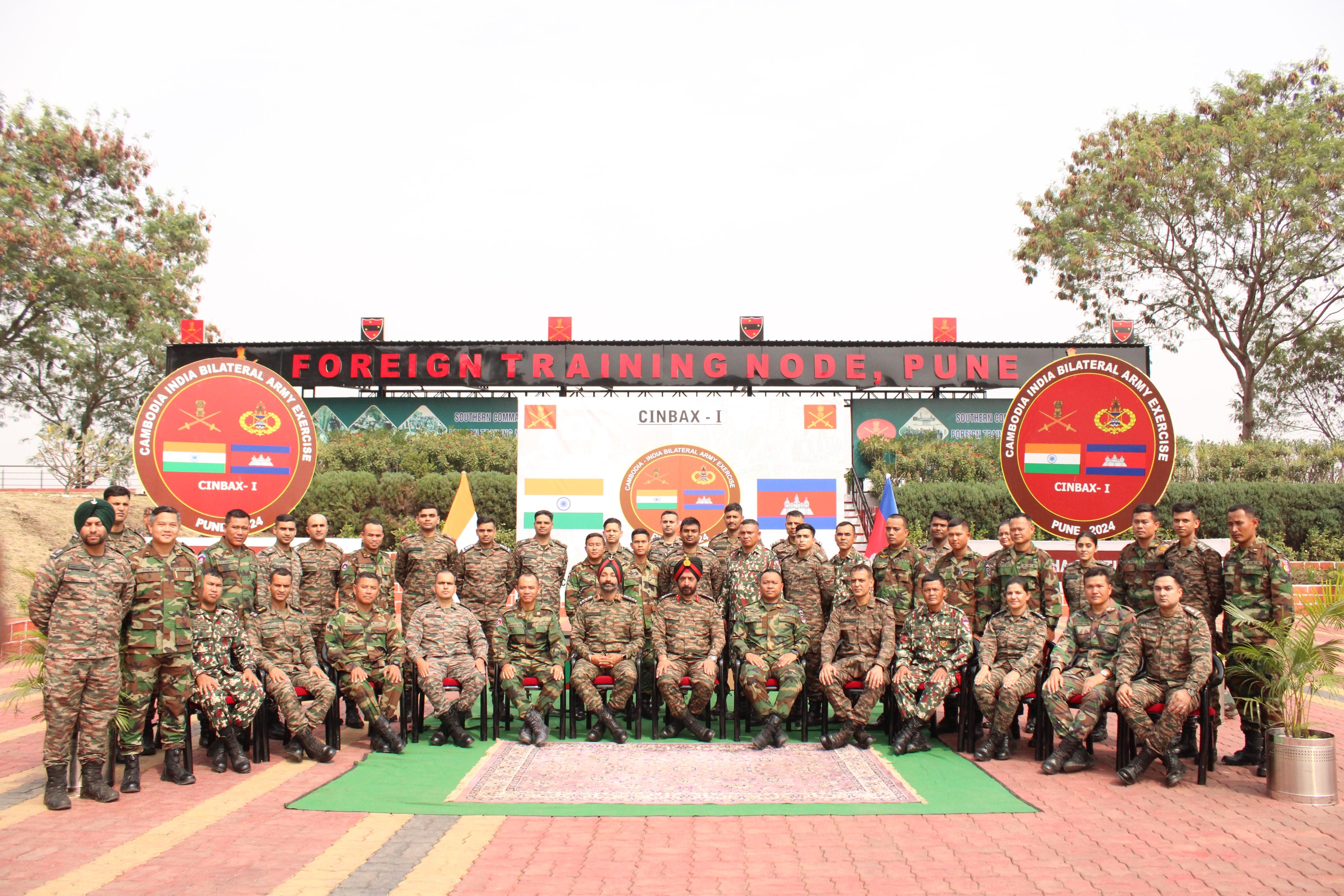India-Cambodia Joint Military Exercise CINBAX

- 01 Dec 2024
In News:
The first edition of CINBAX (Counter-Terrorism Counter-Bio-Terrorism and Intelligence Operations Exercise) was launched on December 1, 2024, at the Foreign Training Node, Pune.
Key Details:
- Participants: 20 personnel from each side – the Indian Army and the Cambodian Army – focusing on enhancing cooperation for UN peacekeeping operations.
- Objective:
- Enhancing Trust and Interoperability: CINBAX aims to foster mutual trust, build camaraderie, and improve operational efficiency between the two armies in conducting peacekeeping operations under UN guidelines.
- Focus Areas: Joint Counter-Terrorism (CT) operations, Intelligence, Surveillance, and Reconnaissance (ISR), cyber warfare, logistics, casualty management, and disaster relief operations.
- Phases of the Exercise:
- Phase I: Orientation for Counter-Terrorism operations in the context of UN peacekeeping missions.
- Phase II: Conduct of tabletop exercises to simulate and plan response scenarios.
- Phase III: Finalization of plans and review of lessons learned, focusing on operational strategies and tactical decision-making.
- Key Topics Covered:
- Discussions on setting up a Joint Training Task Force for intelligence, surveillance, and reconnaissance.
- Exploring cyber warfare, hybrid warfare, and unconventional tactics.
- Strategies for managing logistics, casualties, and coordination during Humanitarian Assistance and Disaster Relief (HADR) operations.
- Promotion of Indigenous Defence Equipment:
- The exercise will showcase Indian-made weapons and defence equipment, supporting India’s commitment to Atmanirbhar Bharat (self-reliance in defence production).
- Objective: To highlight India's advanced military technology and indigenous defence capabilities.
- Significance for India-Cambodia Relations:
- The exercise strengthens military ties between India and Cambodia, contributing to improved cooperation in regional peacekeeping efforts.
- CINBAX marks a significant milestone in India-Cambodiadefence collaboration and sets the stage for future joint operations.
India-Cambodia Bilateral Relations
- Historical Context:
- India and Cambodia share strong religious, cultural, and linguistic ties, with Hindu rituals influencing Cambodian culture and Sanskrit and Khmer sharing common words.
- Diplomatic relations were established in 1952, even before Cambodia's independence from France.
- Key Developments:
- 1954: Prime Minister Jawaharlal Nehru visited Cambodia, initiating strong diplomatic ties, particularly during the Non-Aligned Movement.
- Post-1970s: India played a pivotal role in Cambodia's recovery from the Khmer Rouge regime. India was the first democratic country to recognize the Heng Samrin regime in 1981 and contributed to Cambodia's political reconciliation.
- 1980s: India facilitated dialogue for the Paris Peace Accord and contributed to the success of UNTAC elections in 1993.
- Strategic and Economic Cooperation:
- Defence: Enhanced cooperation in defence capacity building, military training, and infrastructure development.
- Trade: India exports pharmaceuticals, bovine meat, automobiles, and leather products to Cambodia. In return, Cambodia exports organic chemicals, apparel, and footwear to India.
- Mekong-Ganga Cooperation (MGC): Established in 2000, MGC includes Cambodia and aims to enhance cooperation in sectors like trade, education, tourism, and cultural exchanges.
- Recent Collaboration:
- India has extended financial assistance for infrastructure projects in Cambodia, especially in restoring and conserving cultural heritage sites like Angkor Wat.
- MoUs signed in bilateral cooperation, cultural exchanges, and development projects highlight the growing India-Cambodia strategic partnership.
